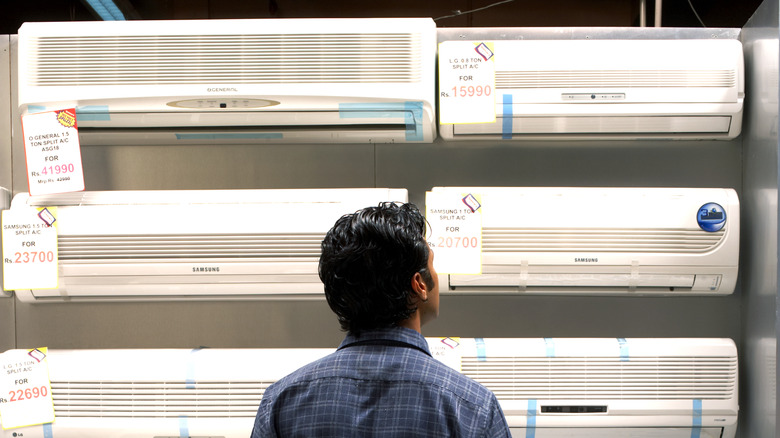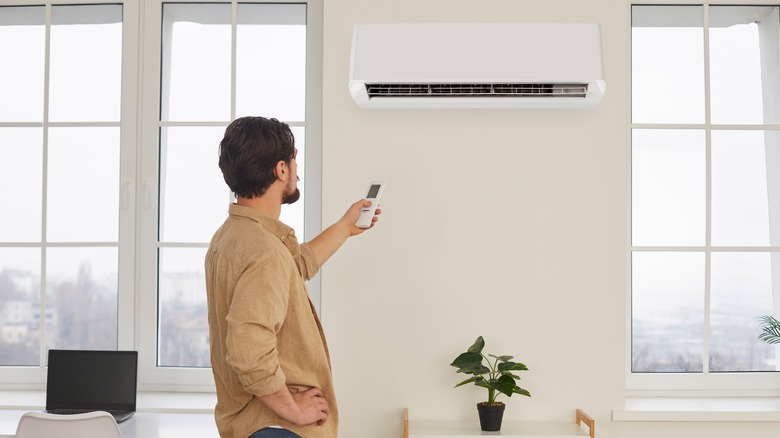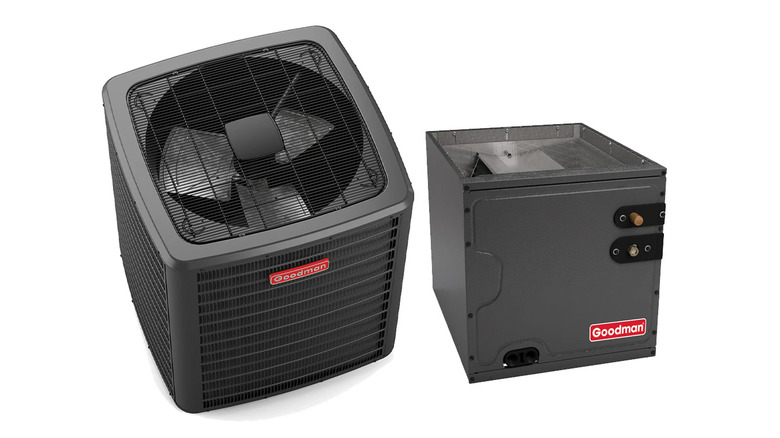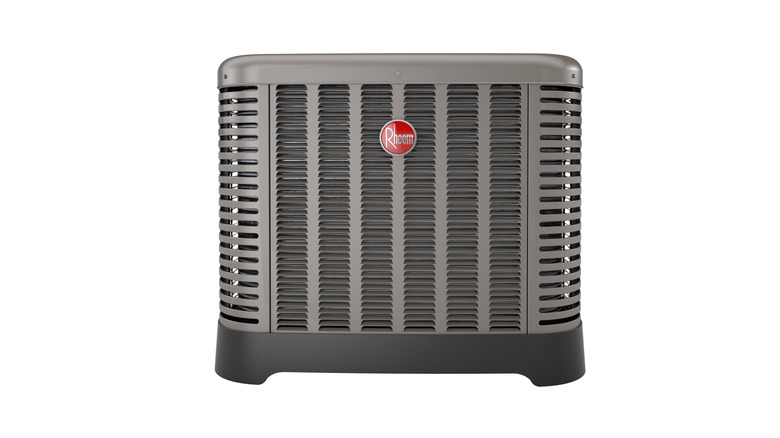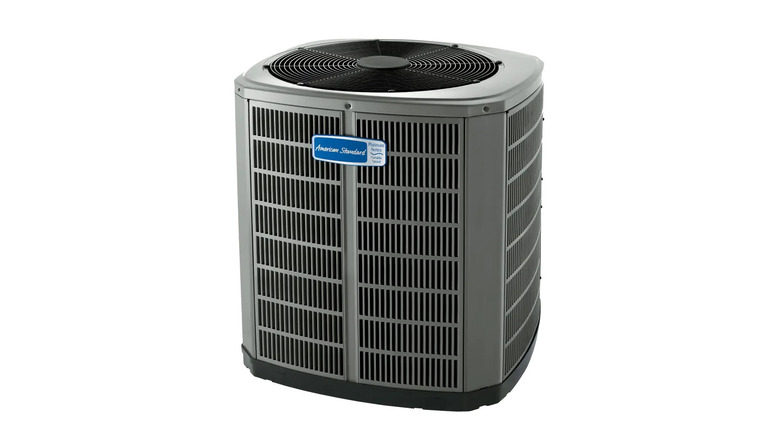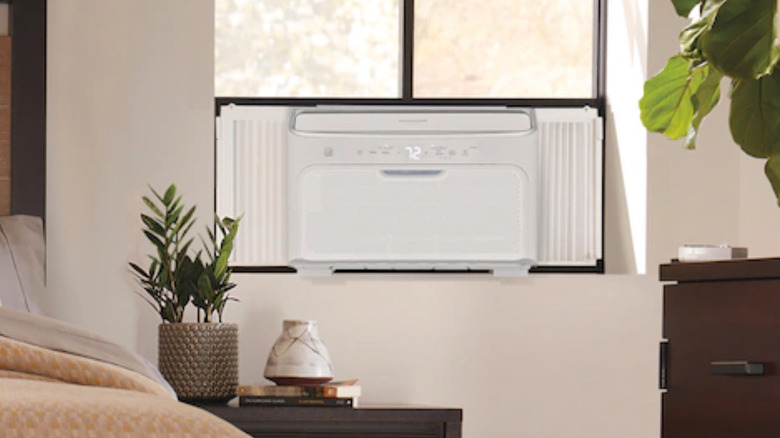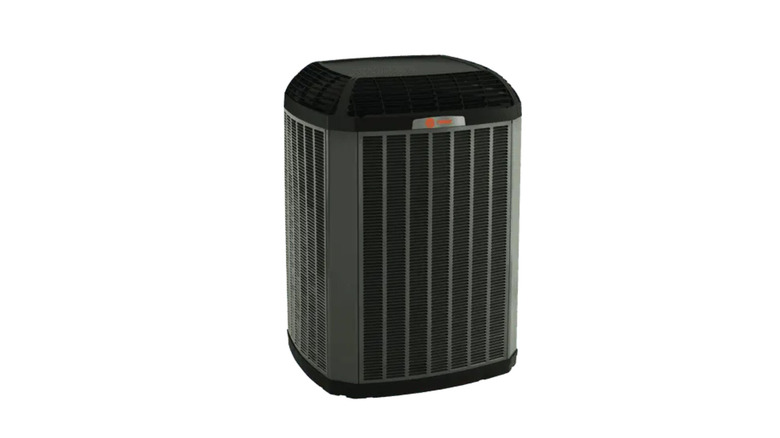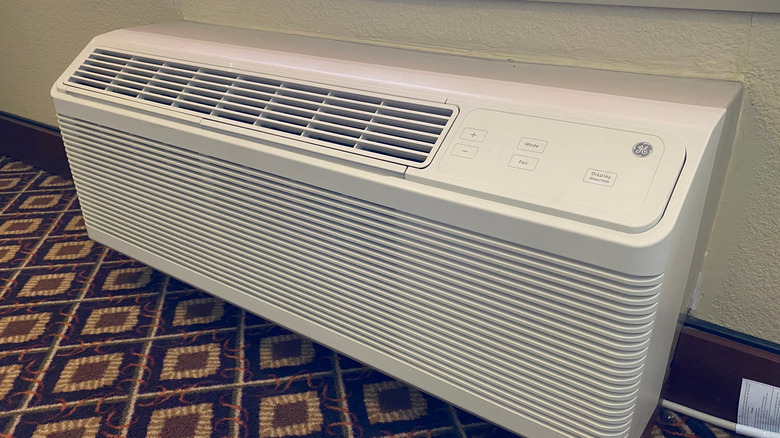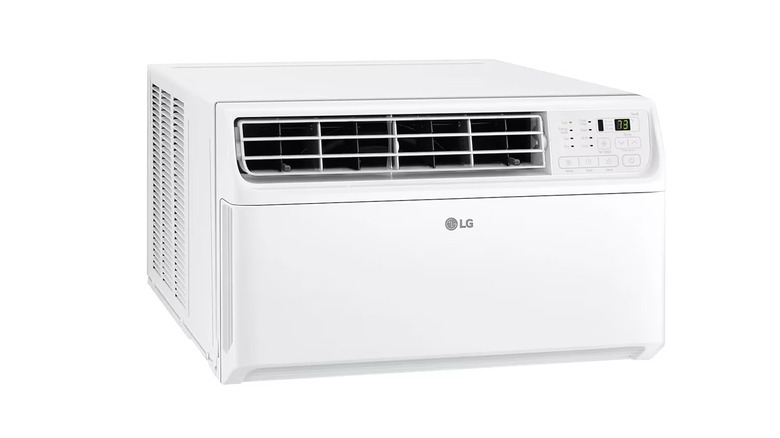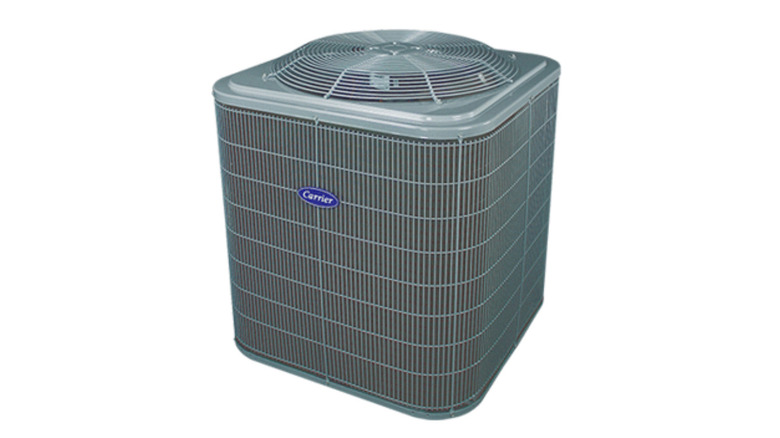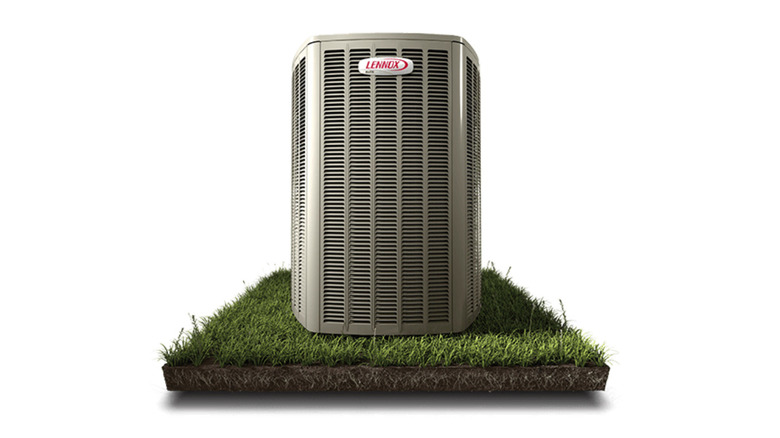Every Major Air Conditioner Brand Ranked Worst To Best
Once a year (possibly more than once these days thanks to climate change) we experience summer and its uncomfortably warm temperatures. So inevitably people are going to want to buy themselves an air conditioner, or replace an old one that doesn't quite pull its weight anymore.
How does one go about choosing what kind of air conditioner to get? There are a whole lot of factors to consider before even looking at brand names, such as whether you want a wall-mounted unit, window-mounted unit, or an entire home climate control central air system. Budget can be a limiting factor as well, which may also impact what kind of A/C you need to be looking at. Even once you've narrowed down your choices there's still the very real possibility that one company may produce better window air conditioners while another is better with central air systems. It can be a lot, which is why we've put together a list to act as a sort of basic guide for anyone looking to artificially lower the temperature in their living space.
This list has been assembled and organized using a combination of sources, such as brand breakdowns from reputable websites like Architectural Digest and This Old House, along with customer ratings and complaints documented on Consumer Affairs and the Better Business Bureau. Individual product reviews from customers as well as professional reviewers have also been factored in.
Central air vs. standalone units
The difference between a window-mounted air conditioner and an entire central air system is more than just their physical construction. In most cases, you're looking at a few hundred dollars for a window unit and several thousand for something that controls the climate in an entire home. Though wall-mounted A/C units sit somewhere in the middle, being less expensive than central air but still requiring installation by a HVAC technician.
Even beyond basic price, though, there are other distinctions to keep in mind. A/C window units can be bought in a store, brought home, and installed on their own. They can break or wear down over time, and when that happens it's usually simpler to replace rather than repair. Central air systems, on the other hand, require professional installation and can take time to put together. Maintenance on a central air system can also get expensive, depending on what goes wrong or needs replacing, and most warranties only cover parts (not labor) so even if you're still covered repairs may still be costly. Once again wall units sit between the two, with maintenance and cleaning simpler than central air but more involved than a window unit and installation that costs more than window A/C but generally less than central air.
All of this is to say that someone's experience with a given A/C brand can vary greatly if they buy an entire central air system or a window unit. So please keep that in mind while perusing this list.
9. Amana and Goodman
Lumping two different brands together right out of the gate might seem odd, but this is because both are owned by the same umbrella company: Daikin Industries, Ltd. They're more like siblings in that, while they offer different models, you're generally dealing with the same policies and customer service.
Goodman is considered to be a respectable workhorse type of A/C, usually found for around $1,500 to $10,000, with a focus on HVAC (central air) systems. It uses specialized filters and guards for many of a unit's internal systems, along with offering 10-year limited warranties on both parts and entire unit replacement. This is probably why the brand pops up so frequently on lists like these, though be aware that not all technicians that carry Goodman units are certified installers, which could potentially have a significant impact on how well (or poorly) a Goodman A/C unit performs over the years (or even months).
Amana air conditioners are often considered "average" in terms of performance and are priced in the neighborhood of $3,000 to $11,000. However, many of the company's units advertise "ComfortBridge," which Amana claims will automatically adjust the settings on the unit to provide comfortable temperatures at more efficient energy levels. Amana A/Cs are also purported to be easier to shop around for thanks to a user-friendly website, and the brand sells a variety of window-mounted units (in addition to HVAC systems).
8. Rheem
Rheem A/C and HVAC units are often considered to be both comparably affordable (as far as hardware like this goes) with prices generally around $3,000 to $7,000, and of good quality. That said, they're also often referred to as "average" from a performance standpoint when compared to other major air conditioner brands.
The company's EcoNet line is often touted as a big draw, too, as it allows the A/C unit to other smart-home devices that use the EcoNet system. This promises more nuanced control over the temperatures (among other things) in your home, as well as energy savings.
Today's Homeowner estimates that the average Rheem unit should last for around 15 to 20 years, depending on a number of variables like the quality of the installation and whether or not it's regularly maintained. Customer support seems to be Rheem's biggest drawback at the moment, with its website customer support (or lack thereof) being a particular sore point. However, as long as your A/C unit behaves itself, it's a headache you likely won't have to deal with anyway.
7. American Standard
American Standard is another company that focuses on central air (HVAC) systems rather than self contained window units. However it's considered by many to be competitively priced in the wider HVAC market.
Efficiency and performance are also highly regarded in many American Standard systems, particularly for the $3,000 to $11,000 price point, and installation is often cited as one of its biggest draws due to a dedicated network of certified dealers. Meaning you can expect anyone selling American Standard HVAC systems to know exactly what they're doing. On top of which, some models can also integrate with American Standard's AccuComfort or AccuLink smart thermostats for a smart home setup.
The trade-off with American Standard comes by way of other costs and the extended coverage. The brand's specialized network of carriers offers convenience, but it also tends to make the price of an installation a bit higher. Additionally, the company doesn't offer warranty coverage on a unit's compressor (which is a critical component for maintaining temperature control and efficiency) in less expensive models. You'll only get it with higher-end options.
6. Frigidaire
Refrigerators aren't the only cool appliances Frigidaire makes. It also produces several in-window and HVAC A/C units, with a track record of simple reliability, though some newer models do support smart home features and smartphone app control.
That smart home and phone app integration isn't just reserved for its larger HVAC offerings, either. Some of its window units also support smartphone app control and can connect to a home's Wi-Fi. And as This Old House notes, some window A/C units also use the kinds of inverters normally found in bigger hardware to improve circulation and efficiency. This leads to some units exceeding a $1,000 price point, but less expensive (and less complex) models can be found for closer to $500.
Frigidaire's catalog isn't quite as robust as many of its competitors, however, so it may be more difficult to find a unit (HVAC or in-window) that perfectly fits your particular situation. You may also have a tough time getting a hold of a certified professional to install an HVAC system, depending on where you live.
5. Trane
Trane is a name that has become fairly synonymous with central air systems over the years. After all, the tagline "It's hard to stop a Trane" has been burned into many a TV viewer's brain since 1992.
Considering some of Trane's warranty coverage and manufacturing choices, the slogan does start to make sense. The brand features 10 years of coverage on parts and labor, 12 years on the compressor in particular, and internal components like rust-proof base pans imply several years worth of reliable performance. Many of Trane's HVAC systems can also be integrated with a smart home setup, as well as be controlled via an official app.
On the other hand, Trane does tend to price its HVAC systems higher than some other brands (from around $3,000 to over $15,000), and higher-end models require the additional purchase of a ComfortLink II thermostat. As extensive as those warranties are, Trane systems do have something of a track record for needing more maintenance than many of its competitors. In particular, many customers have cited coil failures as an ongoing headache.
4. GE
General Electric (GE) is another well-known brand across a wide variety of appliances, but also in air conditioners. It produces both HVAC and window units, but the in-window options are likely more well known due to their prevalence on store shelves and website pages.
GE's AHTR10AC was SlashGear's own pick for one of the most energy-efficient appliances for your home in 2023 thanks to its Energy Star rating, overall efficiency, multiple control options (remote, voice commands through services like Alexa, smartphone, or built-in buttons). Its ability to send phone notifications when the filter needs to be taken care of is also a plus. Tom's Guide was favorable to GE in its review of the GE Profile ClearView Window A/C, noting its efficiency, quiet performance, and a design that won't block your window's view.
The company's air conditioners also carry an average score of 4.1 out of five stars from customers on Consumer Affairs, with one of the more common complaints being that some units don't function well after they've been stored for the winter season. Its window units are also on the slightly higher end of the pricing spectrum, with many carrying an MSRP of $500 or more (though it does offer several below $300).
3. LG
Arguably the most popular window unit brand in this list, LG can usually be found at or close to the top of highest rated air conditioners from retailers like Home Depot and Best Buy. It also sits within a slightly more moderate price bracket, with units starting as low as $300 and going up to around $900.
LG air conditioners are also widely considered to be one of the quietest options out there, while also being lauded for their overall quality. Many of the brand's portable and window A/C units support smart home connectivity via LG's ThinQ device ecosystem, and can connect to Wi-Fi for mobile app control — either at home or while you're away.
Something of note with LG's A/C catalog is that it does not currently include any HVAC units — only window or portable models. If you're in the market for a central air system, this is not a company to turn to. It's also worth pointing out that some of those window-mounted A/Cs can get rather large, which may require extra effort and hardware to install or possibly not fit into a window in the first place (depending on the dimensions).
Be sure to measure before you buy.
2. Carrier
It's tough to look up a list of "best air conditioner brands" without seeing either of these last two entries at the top — or bottom — depending on how the list is set up. The only reason Carrier isn't in the top spot is because of an arbitrary decision by the writer (i.e. me) based on its HVAC systems being the more expensive of the two — priced between $3,000 to $15,000.
It seems as though you do get what you pay for, however, as Carrier is often praised for how quiet most of its A/C units are along with high efficiency ratings. Carrier works closely with Energy Star to meet EPA (Environmental Protection Agency) guidelines, and some of its models even include humidity and air purification control along with general home cooling.
Carrier warranties seem to be a bit contentious, however, with coverage changing between five or 10 years based on when you register the unit – rules which many customers are claiming to be inadequately explained via reviews from Consumer Affairs. Additionally, getting an initial cost estimate will require a bit more effort than with other manufacturers as you'll need to schedule an appointment with a sales consultant.
1. Lennox
In Lennox's case, part of its popularity may have to do with its A/C units being more broadly available at major retailers. As a result, there's little need to jump through hoops to try and find someone who sells and installs them.
Availability isn't Lennox's only strength, however. The brand is also considered to be one of the more energy efficient options out there, and is partnered with Energy Star. That efficiency will vary based on the model, of course, but many of them do tend to rate highly in that regard. The brand's signature line can also be fitted with SunSource technology, which allows the A/C unit to power itself from a home's solar energy system.
Lennox hardware is a little on the pricey side with an MSRP from around $3,000 to $10,000, but it's not the most expensive brand out there (or even on this list). That said, its warranties are often criticized due to a lack of conformity between different models. In other words, the amount of coverage you can expect tends to vary based on what specific model you own, according to Consumer Affairs reviews.
